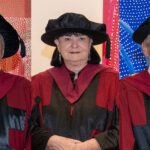Curtin University has partnered with Scotch College on the curriculum for a new elective that asks year nine students to use Science, Technology, Engineering and Mathematics (STEM) to explore drone technology as a solution to real-life issues.
The curriculum is the first joint initiative to be undertaken after Scotch College signed on to Curtin’s newly established Innovative Schools Consortium (ISC), which recognises the commitment of secondary educators to identify and support talented students through innovation in learning and teaching.
A Memorandum of Agreement commits Curtin to working with Scotch College on a number of key initiatives designed to help them achieve strategic objectives in areas such as STEM education, and development of an International Baccalaureate as a preferred pathway into Curtin for high achieving students.
Scotch College students also benefit from Curtin programs such as Achievement Centred Engagement for Students (ACES), which includes workshops, seminars, academies and summer camps that build skills and strengths in innovation, creativity and entrepreneurship.
Scholarships for High Achievement and Performance Engagement (SHAPE) will also be available to Scotch College students. These scholarships provide small, incremental grants over time allowing the students to build a record of achievement in recognised entry pathways into Curtin.
Associate Professor David Gibson, Director Learning Futures, said the ACES and SHAPE programs at ISC were intended to build on the strengths, interests and aspirations of students who wanted to accelerate entry into Curtin.
“The Consortium is part of a broader strategy by Curtin to identify students from diverse backgrounds who have the potential to succeed in higher education,” Associate Professor Gibson said.
“The new project-based STEM curriculum is a one semester elective that highlights skills in leadership, collaboration, creativity and communication.
“This is a trial subject for 2016 but eventually we would like to see it extended into two semesters, and then be available as a course option in year nine through to 12.”


